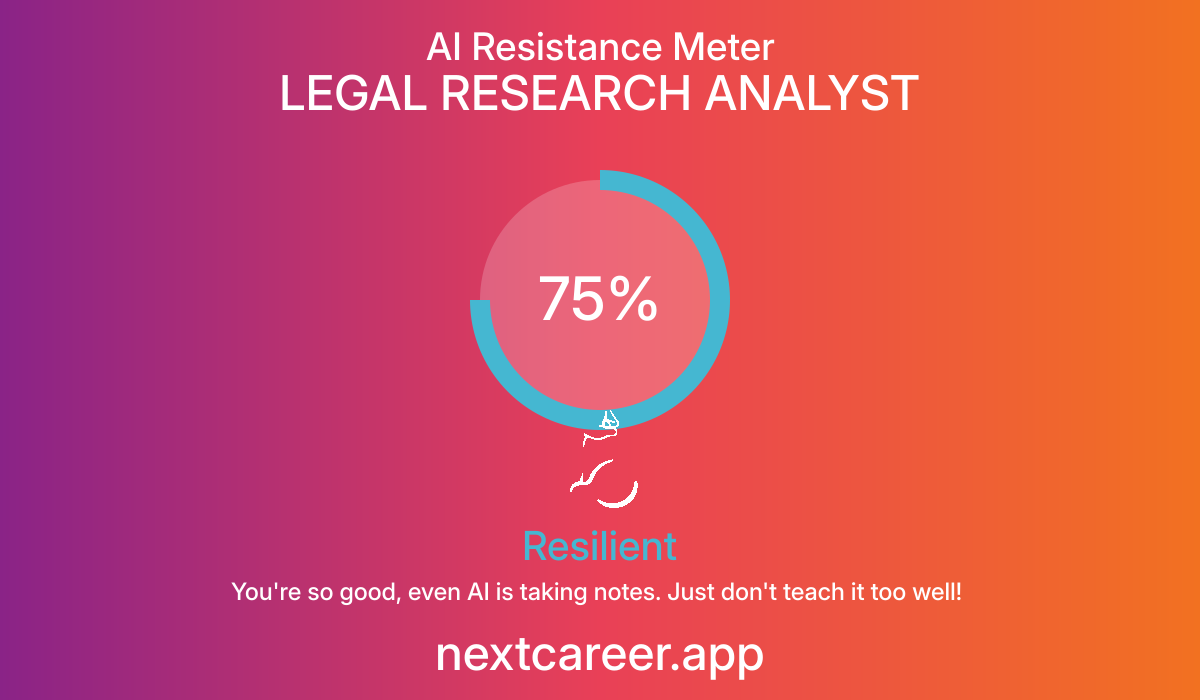AI Resistance Analysis
LEGAL RESEARCH ANALYST
LEGAL RESEARCH ANALYST
AI Resistance Score
AI Resistance Meter
Resilient
LEGAL RESEARCH ANALYST
You're so good, even AI is taking notes. Just don't teach it too well!
Legal Research Analysts are somewhat resistant to AI due to the cognitive complexity of legal reasoning and the necessity for nuanced understanding of context in legal language. However, advancements in AI, particularly in natural language processing and legal databases, threaten to automate many tasks associated with this role, such as the initial search for legal precedents and summarizing cases. In the near-term, AI will augment their work rather than fully replace it, pushing analysts to refine their focus to more complex analytical tasks that require human judgment and contextual understanding.
Legal Research Analysts are somewhat resistant to AI due to the cognitive complexity of legal reasoning and the necessity for nuanced understanding of context in legal language. However, advancements in AI, particularly in natural language processing and legal databases, threaten to automate many tasks associated with this role, such as the initial search for legal precedents and summarizing cases. In the near-term, AI will augment their work rather than fully replace it, pushing analysts to refine their focus to more complex analytical tasks that require human judgment and contextual understanding.
Key Factors
- Cognitive Tasks: AI can already handle basic legal research and document review, significantly reducing the workload for analysts.
- Emotional Intelligence: Analysts often work with clients, requiring them to understand human emotions and provide tailored support, an area where AI currently struggles.
- Physical Skills: This role is primarily desk-based, so physical skills are not a major factor.
- Creative Thinking: The need to synthesize information from various sources and create arguments will still require human creativity, which is a challenge for AI.
Human Advantages
- Humans can interpret the underlying context and nuances of legal issues better than AI.
- Strong interpersonal abilities necessary for client interactions can’t be replicated by AI.
AI Vulnerabilities
- Basic legal research and precedent analysis can be automated with AI tools.
- AI can summarize and categorize cases more efficiently than an analyst.
Recommended Actions
- Invest in continuous education focused on AI tools being used in legal research.
- Develop skills in emotional intelligence and client relations to enhance areas where AI is less effective.
- Engage in interdisciplinary learning, combining law with technology or analytics to better leverage AI in the legal field.
In the near-term (5 years), AI tools will become critical companions to Legal Research Analysts, automating routine tasks but creating demand for skills in legal reasoning and strategic thinking. Over the long-term (20+ years), as AI systems become more sophisticated, analysts will need to pivot to roles that require human intuition, ethical considerations, and a deeper understanding of complex legal scenarios, potentially evolving into roles that focus on a combination of legal advisory and personal advocacy.

Why Calculate AI Resistance?
Understanding how AI-resistant your career is becoming increasingly important in today's rapidly evolving job market. Our analysis combines multiple factors including required human skills, technological adaptability, and future industry projections to give you a comprehensive view of your career's sustainability.